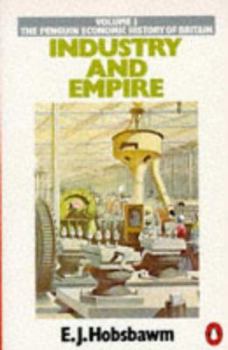Industry and Empire: From 1750 to the Present Day
Select Format
Select Condition 
Book Overview
Premier historian Eric Hobsbawm's brilliant study of the Industrial Revolution, which sold more than a quarter of a million copies in its original edition, is now back in print, updated for a new... This description may be from another edition of this product.
Format:Paperback
Language:English
ISBN:0140137491
ISBN13:9780140137491
Release Date:May 1990
Publisher:Penguin Group
Length:384 Pages
Weight:0.58 lbs.
Dimensions:0.7" x 5.2" x 7.7"
Customer Reviews
3 ratings
Good introduction to the econonomic history of Great Britain
Published by Thriftbooks.com User , 18 years ago
Industry and Empire is a rare book that incorporates both a economic historical perspective and a political perspective, both on the English scene and on the world scene. What you'll find in this book is a combination of a narrative of how exactly the industrial revolution started in Britain, how it effected the people involved, the social structures of society, how the political structure of Britain changed in response to the economic changes and how Britain's colonial ventures shaped this and were shaped by the changes that were taking place. The book is good even if you're not particularly interested in the specific history of the emergence of the industrial revolution in Great Britain because it's a wonderful introduction to economic reasoning from a left perspective, real materialist economic history, and going through the book, which is not as easy as Howard Zinn, for instance, will give you an introduction to what's possible in analyzing how society works.
Commerce helped to make them free (Voltaire)
Published by Thriftbooks.com User , 19 years ago
Eric Hobsbawm's analysis of the Industrial Revolution is magisterial. The IR was not only an acceleration of growth, but an acceleration of growth through economic and social transformation. It was also solidly founded on political and military pillars. Politically, the kings were subordinated to Parliament, which was controlled by an oligarchy of landowning capitalist aristocrats. The British government based nearly all its policies on economic ends. At home, it provided support for technical innovation and the development of the capital goods industry. It crushed also foreign competition. Its foreign policies were based on war and colonization, which permitted to capture other countries' export markets. Militarilly, it used the strenght of its Navy as a trade-minded weapon. The first phase of the IR (1780-1840) was based on cotton; the second one on coal, iron and steel. It constituted for nearly the whole British population a fundamental change, from the countryside to the city, and from a life of bare and uncertain subsistence to relative affluence. The decline began already before WWI, when Britain became a parasitic economy, living off the remains of world monopoly. The last part of the book is rather more an enumeration of pure statistics. The author states also that Britain was 'never defeated in war, still less destroyed.' In his magnificent biography of J.M. Keynes (part II), Prof. Skidelsky shows clearly that the debt contracted during WWII left Britain bankrupt after the war. His analysis of the negotiations about the Bretton-Woods system and the conversion of the British debt exposes mightily that the ultimate goal of the US Administration was the destruction of the British Empire and its Commonwealth ties. The US operation was a sound success. The US assured its place as new world leader, until now. A highly recommended book.
The Cause of Progress
Published by Thriftbooks.com User , 20 years ago
So, why did the industrial revolution first happened in Britain, and not somewhere else? This is a hotly debated topic among a subset of historians, and has puzzled me for a long time. Is it due to the geography and natural resources of the Isles, the character of its people, or was it just one of those accidents of history? More than that, how do you properly formulate such a question, and what methods can be used to arrive at a sensible answer? Hobsbawm is probably as well equipped as anyone to try to answer this question, and does a pretty good job of it, I think. At least his method, to concentrate on the antecedent macro-economic setting, and to compare its more or less unique features with other competing regions, rather than such vague and elusive possibilities of a superior political system or a certain theological proclivity toward work or something, appears to be sound. His focus seldom refers to personalities, nor, surprisingly, the technological inventions that were so important--he seems to assumes that they were made as a matter of course, given the business climate of the times.The book covers much more than the industrial revolution-- it carries the narrative into the last half of the twentieth century, and covers the same ground in Wales and Scotland, too. His writing style is a pleasure to read and the book is accompanied by 52 graphs in an appendix that brings some additional meat to the table. This is quite possibly the best book around for understanding this critical period in the progress of man, and rewards time well spent.






